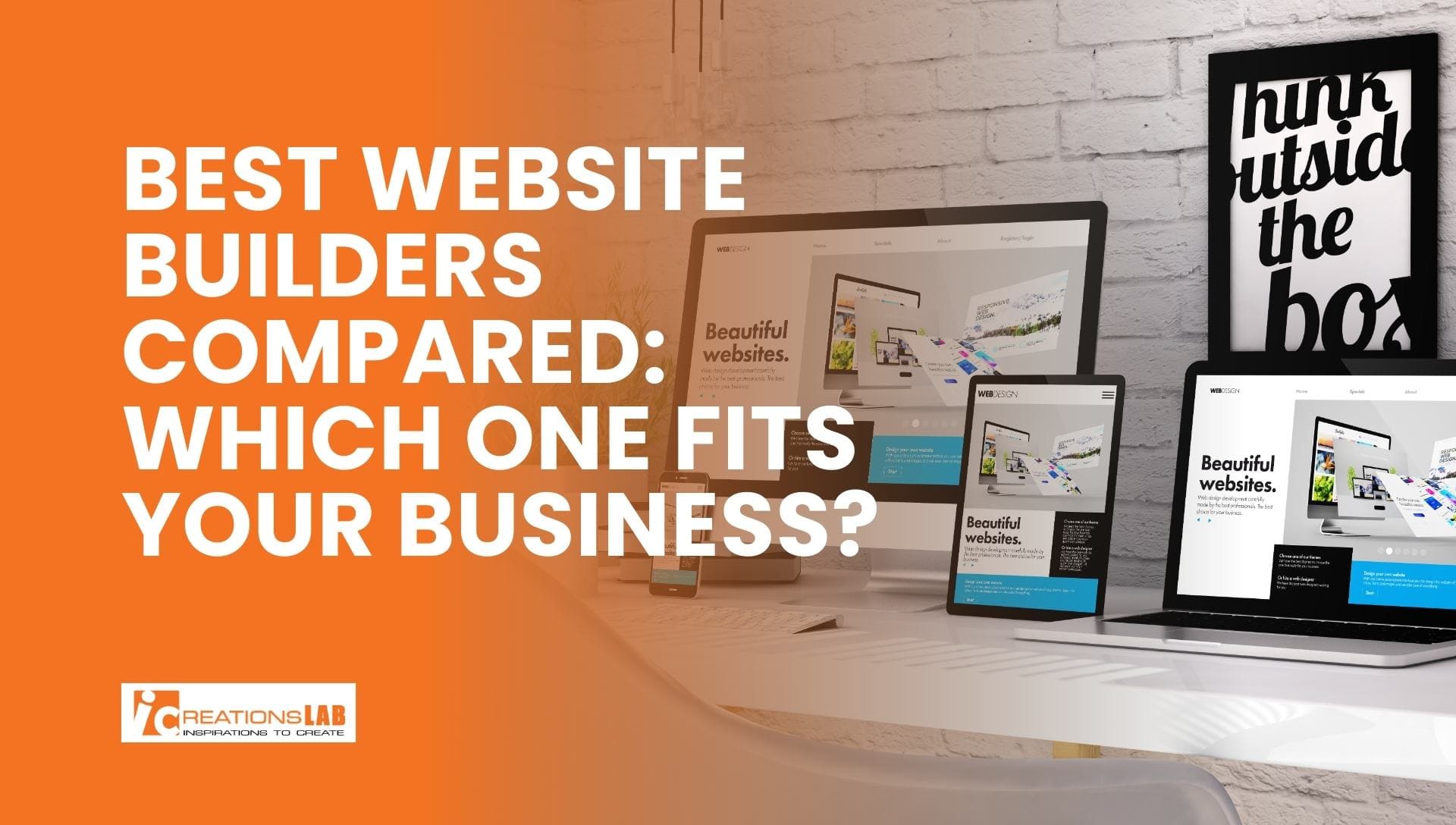In today’s digital-first world, your website is more than just an online brochure—it’s the foundation of your brand, the first touchpoint for potential customers, and often the deciding factor in whether visitors choose to trust your business. With so many platforms available, the challenge lies in finding the Best Website Builders that align with your goals, resources, and long-term strategy.
This article breaks down the most popular options, compares their strengths, and helps you decide whether a DIY builder or a professional agency solution is right for your business.
Why Choosing the Best Website Builders Is So Important
Your website is the digital face of your business. In many cases, it’s the first interaction potential customers will have with your brand—and first impressions matter. A site that looks outdated, loads slowly, or is difficult to navigate can drive visitors away instantly. On the other hand, choosing the Best Website Builders allows you to create a professional, engaging platform that builds trust and drives results.
Here’s why the choice is so critical:
- Improved Search Visibility – Many of the best builders come with SEO-friendly features such as customizable meta tags, clean code, and fast-loading pages, which help boost your rankings on Google.
- Mobile-Optimized Design – With mobile users making up more than half of all web traffic, responsive layouts ensure that your site delivers a seamless experience across smartphones, tablets, and desktops.
- E-Commerce Ready – From product catalogs to secure checkout systems, the right website builder provides everything you need to launch or expand your online store.
- Analytics & Insights – Built-in tracking tools or integrations with Google Analytics give you valuable data on visitor behavior, sales funnels, and ROI—helping you make smarter business decisions.
- Marketing Integration – Modern website builders connect seamlessly with email platforms, social media, and customer relationship management (CRM) systems, enabling you to run coordinated marketing campaigns.
- User-Friendly Content Management – Even non-technical users can update pages, upload images, or add blog posts without needing to hire a developer.
- Security & Reliability – Leading platforms include SSL certificates, regular updates, and hosting support, ensuring your site stays secure and available 24/7.
In short, selecting the Best Website Builders isn’t just about getting your site online—it’s about creating a growth-ready platform that attracts visitors, converts them into customers, and scales with your business.
See More: How Custom Web Development Services Can Skyrocket Your Sales
The Most Popular Website Builders Compared
Choosing the right platform is critical for building a website that truly supports your business goals. Here’s an in-depth analysis of the most widely used platforms, their strengths, weaknesses, and who they’re best suited for.
1. Wix
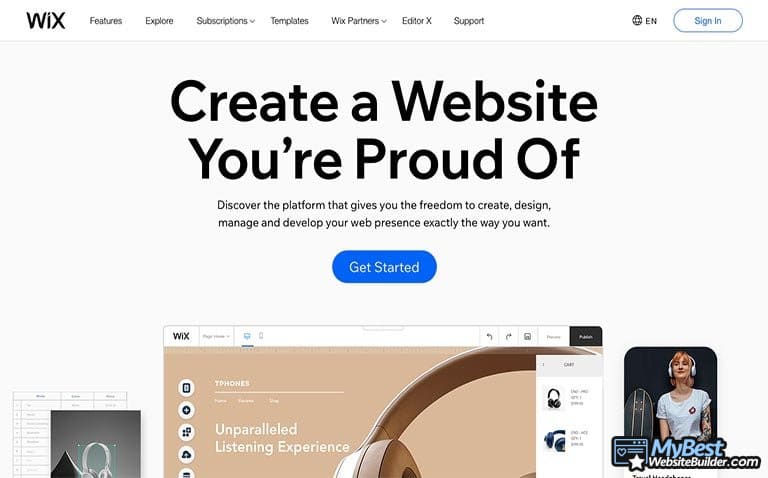
Overview:
Wix is widely recognized as one of the most beginner-friendly drag-and-drop website builders. It allows users with little to no technical knowledge to create professional-looking websites quickly. With over 800 templates and an intuitive editor, Wix empowers businesses to build a strong online presence without hiring a developer.
Strengths:
- Intuitive Drag-and-Drop Editor: No coding required, making it easy for anyone to design pages exactly how they envision.
- Extensive Template Library: Over 800 modern, industry-specific templates, including options for portfolios, online stores, restaurants, and more.
- Built-In SEO Tools: Features like customizable meta tags, alt text, URL management, and automatic mobile optimization help your site rank better in search engines.
- App Market Integration: Add advanced functionalities such as booking systems, live chat, chatbots, email marketing, and social media feeds.
- Fast Setup: Ideal for businesses that need to launch quickly without lengthy development timelines.
- Automatic Updates & Hosting: Wix handles security, hosting, and software updates, reducing the maintenance burden for users.
Weaknesses:
- Limited Scalability: While great for small sites, Wix may struggle with complex websites or very large businesses with high traffic and advanced functionality needs.
- Restricted Backend Customization: Users have limited access to server-side code, making it harder to implement unique features or integrate with custom systems.
- Template Lock-In: Once a template is chosen, it’s difficult to switch without rebuilding parts of the site.
- Performance Variability: Sites with heavy content or advanced apps may load slower compared to custom-built solutions.
Recommendation:
Wix is an excellent choice for small businesses, startups, freelancers, creatives, and anyone seeking a visually appealing, professional website without technical hurdles. It’s particularly suitable for businesses that prioritize speed, ease of use, and affordability over complex customization.
2. Squarespace
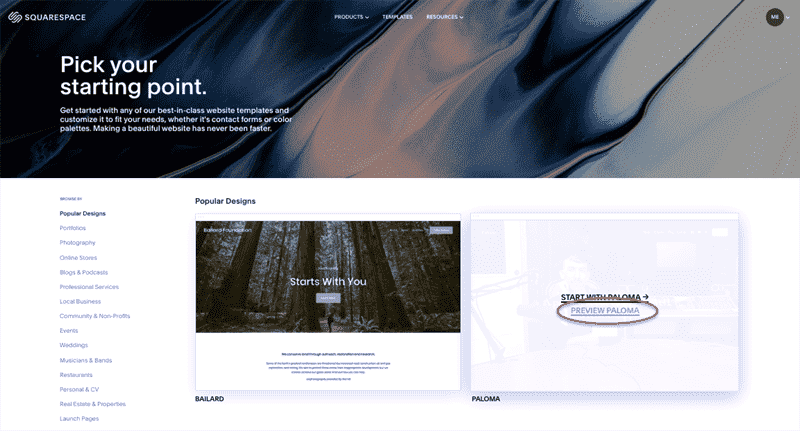
Overview:
Squarespace is renowned for its elegant, design-centric templates and user-friendly interface. It appeals to businesses and individuals who prioritize aesthetics and want a visually stunning online presence without deep technical expertise. Squarespace is especially popular among creative professionals, boutique brands, and small businesses that want a polished, modern website.
Strengths:
- Beautiful, Professionally Designed Templates: Squarespace offers a curated collection of templates optimized for visuals, ideal for portfolios, photography sites, restaurants, and boutique brands. Templates are fully responsive and mobile-ready.
- Integrated E-Commerce & Blogging: Users can launch online stores, manage inventory, and sell digital or physical products. The built-in blogging platform also allows easy content marketing and SEO-friendly posts.
- Responsive & Mobile-Optimized: All designs automatically adjust to desktop, tablet, and mobile devices, ensuring a consistent user experience.
- All-in-One Platform: Hosting, SSL certificates, and site security are included, reducing the technical overhead for users.
- 24/7 Customer Support: Access to email and live chat support, along with a comprehensive knowledge base and community forums.
- Design Flexibility Without Coding: While templates are structured, Squarespace allows sufficient design customization to match brand identity.
Weaknesses:
- Steeper Learning Curve: Squarespace is slightly less intuitive than Wix, especially when customizing layouts or complex features.
- Limited Third-Party Integrations: Compared to open-source platforms like WordPress, there are fewer plugins and integrations available, which can restrict advanced functionality.
- Higher Pricing for E-Commerce: While suitable for small shops, Squarespace’s transaction fees and subscription costs may add up for larger online stores.
- Template Rigidity: Switching templates mid-project requires redesigning some content, which can be time-consuming.
Recommendation:
Squarespace is ideal for creatives, photographers, designers, boutique brands, and small businesses that want a premium, visually impressive website. It’s perfect for users who value design, aesthetics, and an all-in-one solution without needing extensive technical customization.
3. Shopify

Overview:
Shopify is widely regarded as one of the leading platforms among the Best Website Builders for e-commerce. It is designed specifically for online stores and provides a complete ecosystem for businesses to sell products, manage inventory, and scale operations efficiently. Shopify is trusted by small boutiques and global retailers alike for its reliability and robust features.
Strengths:
- Comprehensive E-Commerce Features: Shopify offers everything needed for an online store, including product management, multiple payment gateways, shipping integrations, tax calculations, and inventory tracking.
- Scalability: Shopify can handle small businesses just starting online as well as large enterprises with high-volume sales. Its infrastructure ensures smooth performance even during peak traffic periods.
- Extensive App Marketplace: Users can add advanced functionalities such as marketing automation, email campaigns, dropshipping integration, analytics tools, and customer loyalty programs.
- Security & Reliability: Shopify provides SSL certificates, PCI compliance, and 24/7 uptime monitoring, giving both businesses and customers confidence in secure transactions.
- User-Friendly Backend: Even non-technical users can manage products, process orders, and track sales efficiently.
Weaknesses:
- Cost Considerations: Monthly subscription fees can be high, especially when adding apps or using advanced features. Transaction fees apply unless Shopify Payments is used.
- Limited for Non-E-Commerce Sites: Shopify is optimized for online stores, so using it for content-heavy or service-focused websites may not be ideal.
- Customization Requires Technical Knowledge: While themes are flexible, advanced customization often requires coding skills or hiring a Shopify developer.
Recommendation:
Shopify is perfect for businesses whose primary goal is selling online, from small boutiques to large retail operations. Its robust platform simplifies operations, marketing, and sales, making it easier to focus on growing your business rather than managing technical challenges.
4. WordPress with Elementor or Divi
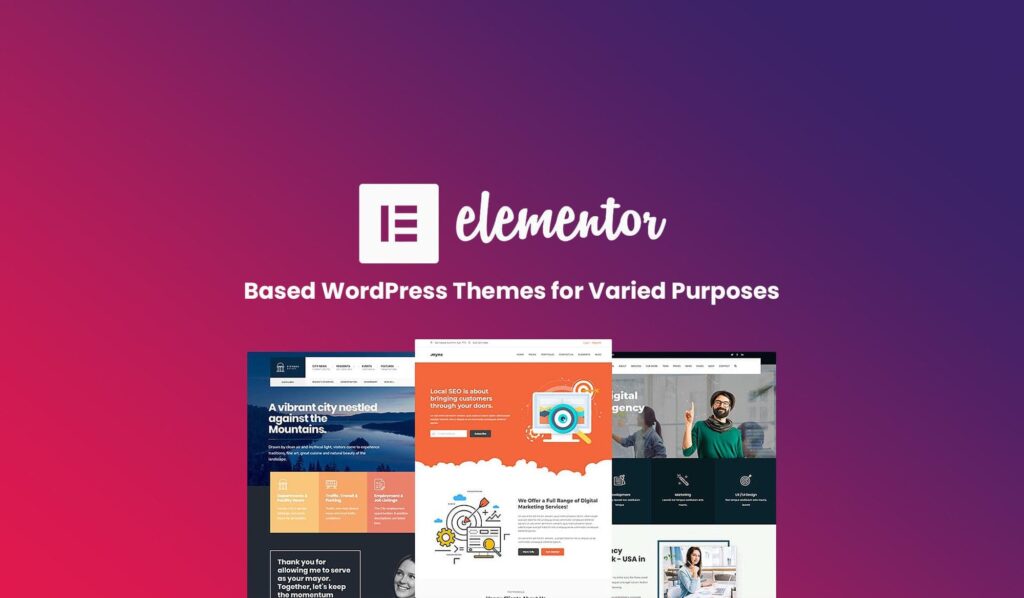
Overview:
WordPress is the most flexible and widely used platform among the Best Website Builders, powering over 40% of websites globally. By combining WordPress with page builders like Elementor or Divi, businesses can create visually stunning, fully customized websites without extensive coding, while retaining advanced functionality and scalability for the long term.
Strengths:
- Unlimited Customization: Thousands of plugins and themes allow businesses to add almost any feature—from booking systems to membership portals, multilingual support, and advanced e-commerce functionality.
- Full Control Over Design and SEO: Unlike many DIY builders, WordPress allows precise control over every aspect of your website, including SEO settings, site structure, and on-page optimization for better search engine visibility.
- Scalable for Any Business Size: WordPress can support small blogs, startups, SMEs, or enterprise-level websites with thousands of pages and high traffic volumes.
- Strong Community and Support: A large global community ensures access to tutorials, forums, professional developers, and ongoing updates.
- Flexible Hosting Options: Businesses can choose hosting that fits their budget and performance needs, from shared hosting to high-performance cloud servers.
Weaknesses:
- Steeper Learning Curve: Beginners may find WordPress and page builders slightly more complex compared to drag-and-drop platforms like Wix or Squarespace.
- Requires Technical Management: Users are responsible for hosting setup, regular updates, security, backups, and plugin compatibility—though agencies can manage this on behalf of clients.
- Potential Plugin Conflicts: Installing multiple plugins can occasionally create conflicts, which may require troubleshooting or professional support.
- Ongoing Maintenance Required: Unlike all-in-one builders, WordPress sites require regular updates to maintain security and performance.
Recommendation:
WordPress with Elementor or Divi is ideal for businesses seeking complete control, advanced functionality, and long-term scalability. It’s perfect for companies planning significant growth, complex websites, or unique custom features that cannot be achieved with standard drag-and-drop builders.
5. Weebly
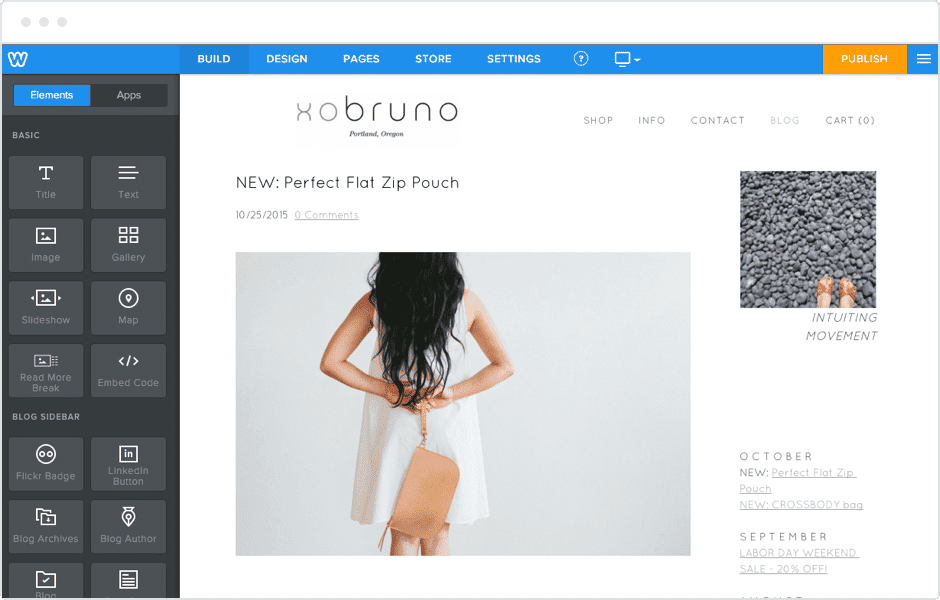
Overview:
Weebly is a simple and beginner-friendly website builder that offers drag-and-drop functionality, making it easy for anyone to create a website quickly. Known for its affordability and straightforward setup, Weebly is ideal for small businesses or local retailers that want a functional online presence without investing in complex web development.
Strengths:
- Ease of Use: The intuitive drag-and-drop editor allows users with little technical experience to build pages, add images, and manage content effortlessly.
- Cost-Effective: Weebly’s pricing plans are among the most affordable, making it an attractive option for small businesses, startups, and local shops.
- Basic E-Commerce Capabilities: Includes features like product listings, shopping carts, secure payments, and inventory management for small online stores.
- All-in-One Platform: Hosting, SSL certificates, and website security are included, reducing technical overhead and ongoing maintenance.
- Quick Setup: Users can launch a website in a short time, which is ideal for businesses needing to go online fast.
Weaknesses:
- Limited Design Flexibility: Fewer templates and customization options compared to Wix or WordPress can restrict unique branding.
- Smaller App Ecosystem: Fewer third-party integrations limit advanced features, marketing tools, or workflow automation.
- Not Suitable for Large or Complex Sites: Weebly works best for small websites; scaling up for high traffic or complex functions can be challenging.
- Template Lock-In: Switching templates may require reformatting content, similar to other drag-and-drop builders.
Recommendation:
Weebly is best suited for small businesses, local retailers, or startups looking for a simple, cost-effective website. It’s ideal for businesses that need a functional online presence quickly and without complex technical requirements.
Comparison Table of Popular Website Builders
| Platform | Best For | Strengths | Weaknesses | Ideal Business Type |
| Wix | Beginners, creatives | Drag-and-drop, SEO tools, mobile-friendly | Limited scalability, backend restrictions | Small businesses, freelancers |
| Squarespace | Design-focused businesses | Beautiful templates, responsive, e-commerce | Higher learning curve, limited flexibility | Creative agencies, boutique brands |
| Shopify | E-commerce | Scalable, robust online store features, secure | Expensive, less suitable for non-retail | Retailers, online stores |
| WordPress + Elementor/Divi | Advanced & scalable | Full customization, SEO, scalability | Learning curve, maintenance required | Growing businesses, complex websites |
| Weebly | Simple websites | Easy to use, affordable, basic e-commerce | Limited templates & features | Small businesses, local shops |
See More: Professional Custom Web Development Services for Businesses in 2025
DIY Website Builders vs. Professional Solutions
DIY website builders, such as Wix, Squarespace, Weebly, and even Shopify for small stores, provide an affordable and fast way to get online. They are ideal for beginners, small businesses, or startups that need a professional-looking website quickly without hiring developers.
However, while DIY platforms have their advantages, they also come with important limitations:
- Template Restrictions: Most DIY builders rely on pre-designed templates. While visually appealing, they can be difficult to fully customize, making it challenging to create a unique brand identity. Businesses using similar templates risk looking like competitors or generic sites.
- Scalability Issues: As your business grows, you may need advanced functionality—such as multi-language support, advanced e-commerce features, or integrated booking systems. DIY platforms often cannot accommodate these complex needs without workarounds or external apps.
- Branding Constraints: Templates may limit layout flexibility, fonts, or color schemes, which can reduce differentiation and professional polish. For businesses aiming to stand out in competitive markets, this can be a significant drawback.
- SEO and Marketing Limitations: While some DIY platforms include basic SEO tools, they often lack the advanced capabilities that a custom-built site can offer, limiting organic traffic growth.
Because of these limitations, many growing businesses eventually move to professional web design solutions. Working with an experienced agency allows for:
- Tailored Functionality: Custom websites can include unique features such as booking systems, client portals, multi-language support, membership areas, or complex e-commerce solutions.
- Brand-First Design: A professional design team ensures your website fully reflects your brand identity, helping you stand out from competitors.
- Advanced SEO and Marketing Integration: Agencies can optimize your site for search engines, implement analytics, and connect with email, social media, and CRM tools for seamless marketing campaigns.
- Future Scalability: Custom websites are built to grow with your business, ensuring your investment supports long-term goals without frequent platform changes.
In short, while DIY website builders are great for quick, affordable solutions, businesses aiming for growth, differentiation, and advanced functionality gain significant advantages by partnering with a professional agency.
See More: How Much Does Web Page Design Cost in Singapore?
Why Choose iCreationsLAB in Singapore
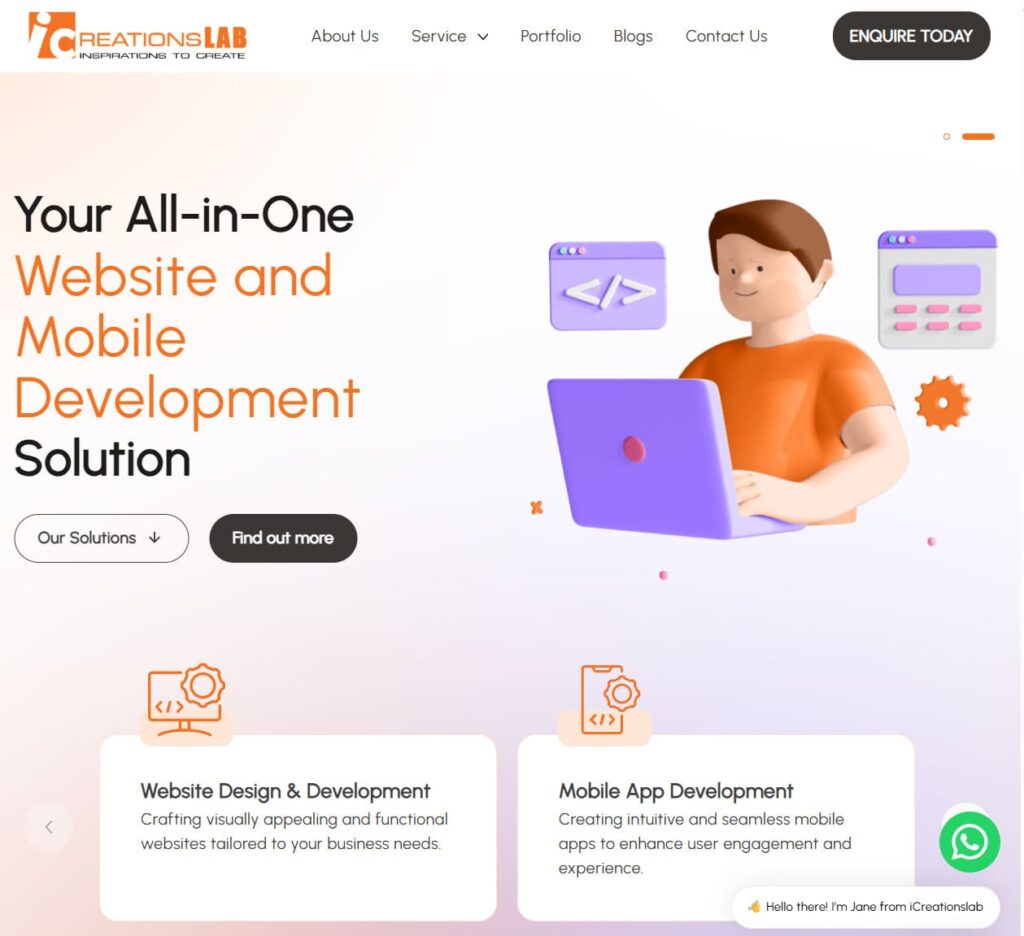
Since 2008, iCreationsLAB has been helping businesses in Singapore build not just websites, but complete digital ecosystems. Unlike off-the-shelf Best Website Builders, we provide custom solutions designed for growth. Our expertise includes:
- Custom Website Design & Development – Tailored to your brand identity and business objectives.
- E-Commerce Development – Scalable online stores built to optimize user experience and conversions.
- Mobile Web Design – Responsive designs ensuring seamless performance across devices.
- CMS Solutions – Easy-to-manage websites for non-technical teams.
- Web Applications – From customer portals to advanced booking systems, we streamline processes.
- Digital Marketing Services – Including SEO, Social Media Marketing, Email & SMS campaigns, and Online Marketing Strategies to boost visibility.
Partnering with iCreationsLAB means you get a website that doesn’t just look good—it works as a business tool that attracts traffic, generates leads, and grows revenue.
Which Option Fits Your Business Best?
- Startups & Freelancers – A DIY builder like Wix or Squarespace can be enough for a quick, low-cost launch.
- Growing SMEs – Platforms like WordPress or Shopify provide flexibility and scalability.
- Established Brands – A custom solution from experts like iCreationsLAB ensures long-term growth, advanced features, and digital marketing integration.
The Best Website Builders provide a foundation, but a professional partner ensures that foundation supports your business ambitions today and in the future.

